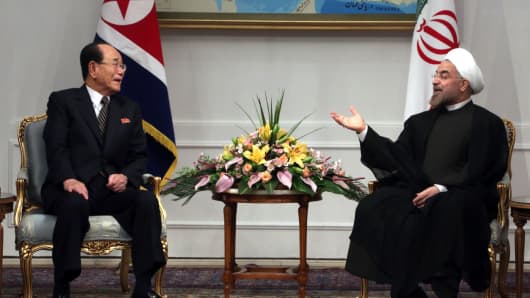That Most Exclusive Club
"What China has done is create an unholy proliferation cooperation network. The Chinese have helped Pakistan, Iran, and North Korea to different degrees."
"The Chinese only need to make discreet material contributions, but all three will eventually benefit from it."
"North Korea and Pakistan are cooperating. North Korea and Iran have been cooperating on missiles. China also remains a principal potential source of such funding."
"But it is just monumentally bizarre that a country as rock-bottom poor as North Korea has such a sophisticated and broad strategic weapons program."
"China has turned Pakistan into a nuclear missile state in order to assist its neutralization of India, and China turns Iran into a nuclear missile state to benefit from that instability as well."
"China has managed to become a major arms supplier in the Middle East because other nations want to defend themselves against Iran, which was made powerful by China."
Richard Fisher, senior fellow, International Assessment and Strategy Center, U.S.
"[Analysts have] frequently underestimated North Korea's nuclear and missile programs. [North Korea's] lengthy collaborative nuclear and missile relationship with Pakistan [which has nuclear warheads and missiles] is to its advantage. [North Korean scientists have] provided critical assistance to Islamabad's missile programs [while Pakistan has given North Korea] uranium based nuclear weapons expertise, technology, and components."
"A.Q. Khan, the father of Pakistan's nuclear weapons program, provided a nuclear package deal to Pyongyang including warhead designs, centrifuges, and nuclear fuel."
"[North Korea will not hesitate to share with Syria] nuclear and chemical weapon technologies."
Bruce Klingner, senior research fellow, The Heritage Foundation
"You cannot fly an airplane from Pyongyang to Tehran without stopping in a military airport in China."
"Whatever it was, somebody had to pay them for it, [rocket engines sold to North Korea] and it got from Point A to point B."
"All that stuff is expensive. Somebody is paying for it. All roads [lead to the CCP [Communist Party of China]."
William Triplett, U.S. intelligence community, former Reagan White House
 |
| Iran showed off its ballistic missile technology in capital Tehran on Sunday. © AP |
There are the questions and there are the complementary responses. The exclusive club of nuclear and missile enterprise under the radar of conventional universal covenants represents a crew the world has learned to recognize as a current and direct threat to world peace; China, Russia, North Korea, Iran, Syria, Pakistan. Russia and China, both communist countries and next-door-neighbours, both members of the United Nations Security Council, usually vote in unison on Security Council sanctions and resolutions; against most.
North Korea is of course a country ruled by an ideology that fits right in with Russia's and China's. And Pakistan, Iran and Syria reflect an Islamist ideology more akin to fascism, but the gap between the fanatic left and the fanatic right is narrow enough to bask in shadows, not conducive to letting in sunlight. Russia provided helpful aids to the development of nuclear weapons to the aforementioned rogue states, with the kind assistance of the Chinese Communist Party. It's a sturdy club, to be sure.
To be fair, it was really the previous Chinese government that did all this heavy lifting. The current government of Xi Jinping is not entirely enthralled with Kim Jong Un and his aspirations, theirs is a tense relationship, with Xi appearing to side with the Trump administration on harsh sanctions imposed on North Korea resulting from Pyongyang's latest showcasing of both nuclear weapons tests and medium-range ballistic missiles. But China remains fixated on maintaining a wall between it and the U.S. presence in the area with North Korea the buffer.
According to a leaked U.S. State Department cable from 2010, North Korea had shipped 19 ballistic missiles to Iran in 2005, giving Iran the capacity to strike Western Europe capitals with the Hwasong-10, or Musudan missile, tested in 2015. The medium-range ballistic missile, according to the Center for Strategic & International Studies, has an estimated range of 2,500 to 4,000 kilometres, its design based on the Soviet SS-N-6 submarine-launched missile.
These suspect states tend to work intimately together on their programs meant to build nuclear weapons. Their agenda is similar and their intention to benefit by working closely together brings them mutual satisfaction in sharing progress, cutting wasted time by replicating what each has succeeded in perfecting. That the North Korean regime is poor represents no roadblock to advancing its nuclear aspirations. Because of its alliance with others, valuing it for the technical data it shares, there is always some contact willing to help it pay for foreign weapons or new technology advances.
Airplanes that were sold by the United States as freight transport to Iran and Pakistan in the 1970s, have been seen in North Korean airfields. In August there were reports that Ukraine or Russia had sold rocket engines to North Korea. The North is not the least disturbed that many of its people live on the brink of starvation and that each time a rocket is launched into the ocean, $30-million in costs are drowned in the effort, never to be recovered.
Labels: Ballistic Missiles, China, Collaboration, Iran, North Korea, Nuclear Technology, Pakistan, Russia, Syria


<< Home